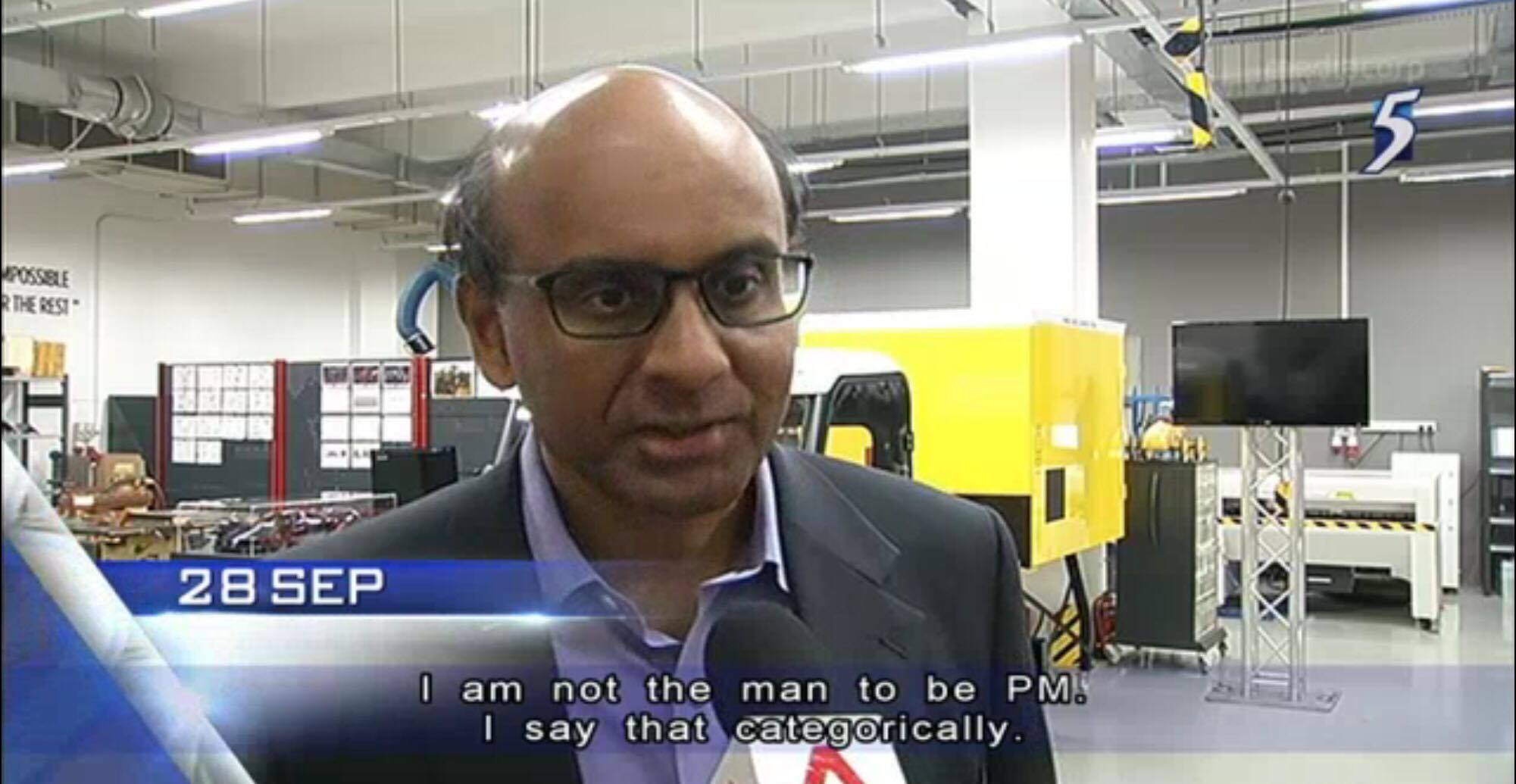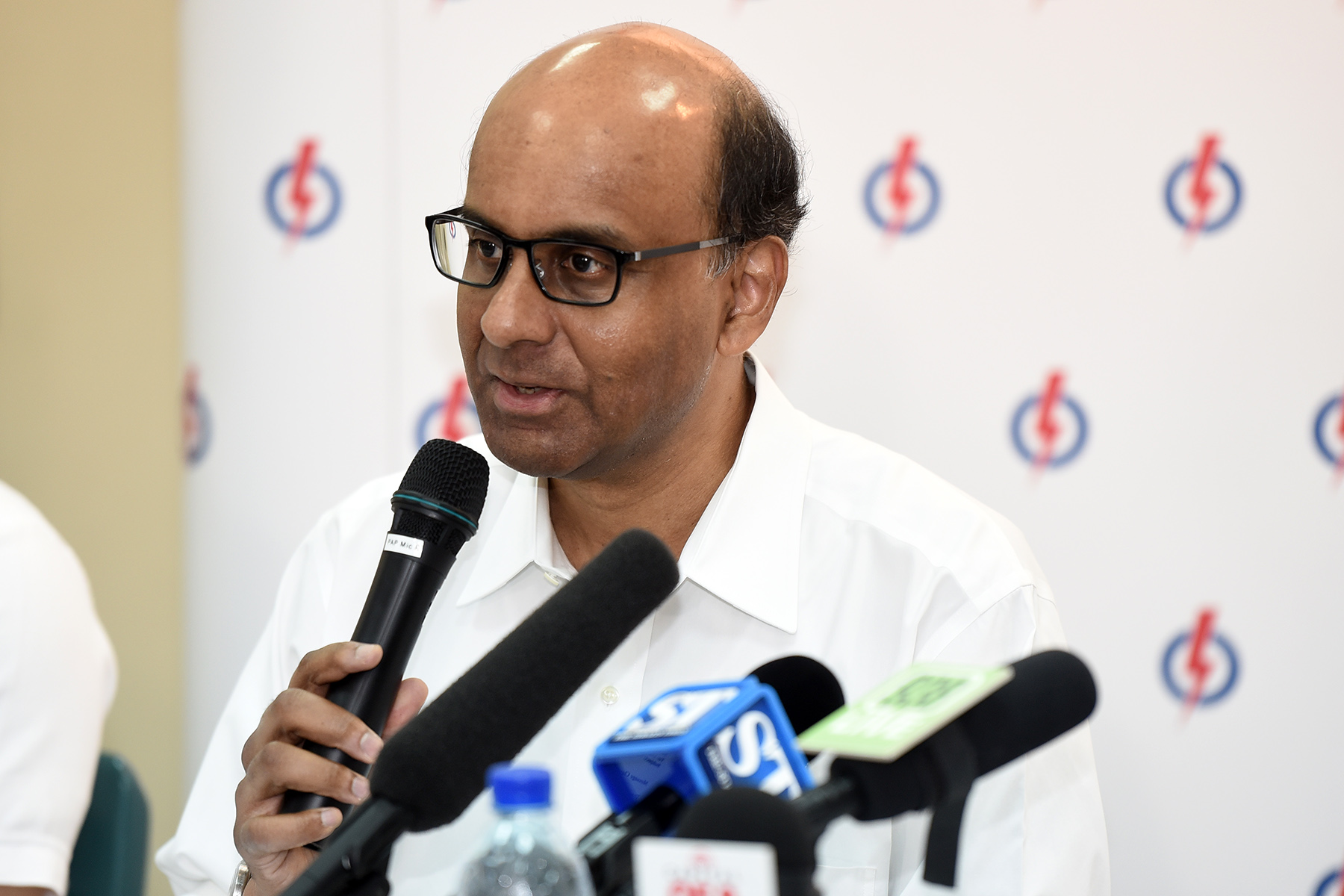It was our "culture", or to be more specific, our "distinctive political culture", explained Deputy Prime Minister (DPM) Tharman Shanmugaratnam, that somewhat describes the uncomfortable political situation that we are in.
And what is this uncomfortable and unique political situation? We kinda know that the next Prime Minister (PM) is likely to be a former Chinese public servant under 55 years old but we do not know who he (but not she) is.
In fact, "culture" was mentioned seven times in his interview at the launch of Wong Fong Industries New Headquarters last night (28 September).
But the timing was awkward -- the short doorstop interview overshadowed PM Lee Hsien Loong's official visit to Japan and even made it as the lead news on News 5 (naughty naughty MediaCorp!).
 Source: Toggle
Source: Toggle
Here's what part of what he said about the speculation, where he used "culture" seven times:
"The first thing we must recognise when we think about leadership in Singapore is that we operate as a team in Cabinet, not as a group of individuals. It may sound commonplace but it isn’t commonplace. Actually it’s a very distinctive political culture that we have in Cabinet, and you have to look around the world to see how distinctive it is. No one is in this for himself or herself. No one is out to outdo someone else in Cabinet, or worse still to undermine someone else in Cabinet because he or she could be a competitor to them.
Everyone is in this as a member of the team. It’s a culture that we’ve built up over time that we absolutely must keep for the future. This team culture in Cabinet.
I see it in the fourth generation of leaders. Some of them came in in the 2011 elections, some came in last year. But they work very closely together. I’ve seen how they work together, and I’ve seen them building up trust with each other. They have this team culture. Whoever’s the next Prime Minister will be part of this team culture.
He or she would be first amongst equals, first among equals in a team.
That’s the first point I want to make. We’ve got to recognise that we have a different culture in Singapore – it’s a team culture. And whoever’s the Prime Minister will be first amongst equals, and that certainly applies to the fourth generation of leaders (our emphasis in bold)."
But why did DPM Tharman have to respond to all these#TharmanforPM speculation and therefore increase these speculations further?
This all started with a survey by market research consultancy Blackbox, which was commissioned by Yahoo News. The poll noted that nearly 70 per cent of the 897 respondents would support Tharman as PM.
And here are three possible reasons why DPM Tharman has no choice but to respond to these speculations:
1. Leadership succession discussion has been going on for too long (since 2011) and has been discussed on a fairly vague level:
PM Lee and several senior Ministers have been talking about leadership succession over the past two general elections (2011, 2015) but little details had been revealed about who the potential PMs are.
In the latest talk about leadership succession, PM Lee, in his National Day Rally speech, mentioned Heng Swee Keat and Lawrence Wong, but in the context of Heng suffering from a stroke and Wong assisting Heng in the Ministry:
"I would just like to cover two things in my speech which I think is important and which I should say tonight. One, to do with leadership succession and I think what happened makes it even more important that I talk about it now...
[F]irst let me talk about leadership succession. We have now got the core team for the next generation in Cabinet, but you know ministers or not, all of us are mortal. Heng Swee Keat (our emphasis) recently gave us a bad scare, worse than what I gave you just now, much worse. I am very glad he pulled through and he is steadily covering his strength...
The doctors have recommended that Heng Swee Keat (our emphasis) avoid contact with crowds for at least a few more months to minimise the risk of infection... But they have given him the go-ahead to do office work with minimum interaction. So, I have decided that Swee Keat will resume his duties as Minister for Finance... I intend to appoint a Second Minister to help Swee Keat out with operational responsibilities at MOF and I have decided to appoint Lawrence Wong (our emphasis). Progressively, Swee Keat will come back to work. Building up leadership and preparing for succession is one of my top priorities. Nothing that has happened has changed my timetable or my resolve to press on with a succession. In the next GE, we will reinforce the team again and soon after the next GE, my successor must be ready to take over from me. 岁月不留人– you cannot wait."
But it has been nearly six years since the first batch of the fourth generation leadership core was made Ministers (Heng and Chan Chun Sing were already Minister and Acting Minister respectively in 2011) and we are none the wiser who the front-runner would be.
As a comparison, then PM Goh Chok Tong entered politics in 1976 and was made the front-runner with his appointment as DPM nine years later in 1985. Current PM Lee entered politics in 1984 and was made the front-runner with his appointment as DPM six years later in 1990.
2. The ruling party has done an underwhelming job in effectively communicating the unique political culture that surrounds political leadership succession in Singapore.
Besides GE, the ruling People's Action Party (PAP) has not adequately explained how politics work in Singapore.
As Singapore's political system follows the Westminster parliamentary system, the nation's leader is chosen by his/her party and not chosen by the people (like the United States). An example is how Theresa May became the British PM after David Cameron resigned. No election was called to elect the next PM of UK. In Singapore, this means that Singaporeans have to appreciate that we do not have a direct say in who the PM will be.
The other thing about Singapore's so-called unique political culture is that the PAP Secretary-General is not chosen by the political party members (like British's Labour party) or nominated by the MPs first before being chosen by political party members (like British's Conservative party).
The next PM, according to PAP Chairman Khaw Boon Wan in a recent letter to The Straits Times, will be picked by the younger Ministers by consensus. In terms of party processes, Khaw said that "the new leader will also have to be elected into the PAP's Central Executive Committee, and become the party's secretary-general".
One unwritten rule of course is age-related, which is somewhat similar to how the Pope is chosen. For instance, only the Cardinals can choose the Pope, and cardinals over the age of 80 are not allowed to vote for the next Pope. In Singapore's case, this means that only the younger PAP Ministers can choose their "first among equals".
Another unwritten age-related rule one observes is that most DPMs do not necessarily become PM, especially if he is older than the current PM. For instance, DPMs Goh Keng Swee, Toh Chin Chye, and S Rajaratnam were older than the late Lee Kuan Yew. DPMs Ong Teng Cheong and Tony Tan were also older than former PM Goh Chok Tong. Likewise, DPMs Jayakumar and Wong Kan Seng were older than PM Lee.
But these are rules, observations and unique quirks in a political system that many Singaporeans may not be aware of.
Which brings us to a final point.
3. While DPM Tharman has responded personally to this round of leadership speculation, an unwritten rule in our unique political culture indicates that more can be done to quell it.
And what is the unwritten rule?
A "younger-than-PM" DPM was always appointed in the past two leadership handovers, making it clear enough to avoid unnecessary speculation on who the front-runner is.
Both Goh and PM Lee were the "younger-than-PM" DPMs appointed during the late Lee Kuan Yew's and Goh's premiership.
It is no wonder that DPM Tharman has to quash all this PM talk personally, because he is the "younger-than-PM" DPM. In fact, both DPM Teo Chee Hean and DPM Tharman are younger than PM Lee.
And the way to stop this leadership speculation bubble from growing further is to appoint a fourth-generation leader as DPM soon.
Both Goh and PM Lee were appointed as DPMs nine and six years respectively after they entered politics.
It has been six years since the arrival of the first fourth generation leaders. If we were to use the "younger-than-PM" DPM timeline to assess leadership succession, a new DPM should emerge before the next GE.
Will we see a DPM promotion in the next Cabinet reshuffle?
Because that will certainly help in reducing the uncertainty about who our next PM will be.
And still in line with DPM Tharman's remarks that Singapore will "not (be) talking about succession within this term of government" and that "there’s no urgency to see succession in this term of government".
Related articles:
Here’s everything DPM Tharman said about being PM when he categorically said “not me” three times
DPM Tharman sounds like a PM when he categorically states he does not want to be PM
Top photo by Lim Weixiang for Mothership.sg
If you like what you read, follow us on Facebook and Twitter to get the latest updates.
If you like what you read, follow us on Facebook, Instagram, Twitter and Telegram to get the latest updates.
